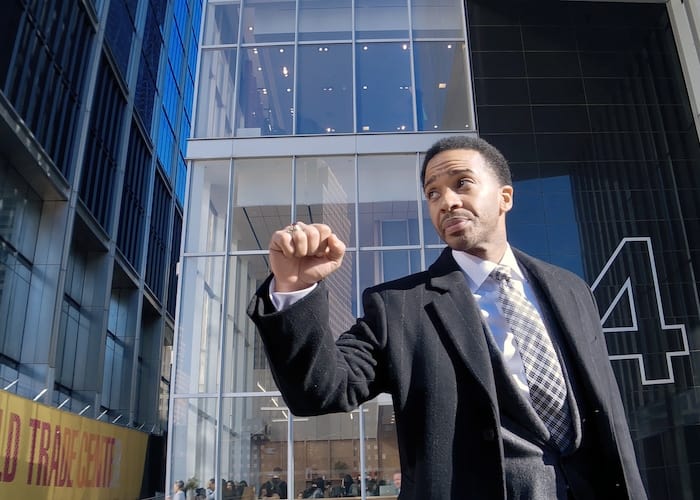
You may not have heard, but Steven Soderbergh has another new movie. High Flying Bird, which recently held its premiere at the Slamdance Film Festival, is now exclusively streaming on Netflix. The sports drama was shot entirely on an iPhone but sure doesn’t look it. Of course, you’ll be focused so much on the performances in this movie to notice any imperfections in the visuals. Andre Holland is outstanding as he pushes through Tarell Alvin McCraney‘s script with confidence.
If you haven’t seen Holland in Moonlight, which is based on a McCraney play, now’s a good time to do so. Also, watch Holland in Soderbergh’s series The Knick. While you’re on that kick, check out the second season of American Vandal especially for High Flying Bird co-star Melvin Gregg, who again plays a hotshot basketball player. Below, I’ve selected eight more movies to watch after you stream the new Soderbergh, and no, it’s not just a list of great basketball movies.
Draft Day (2014)
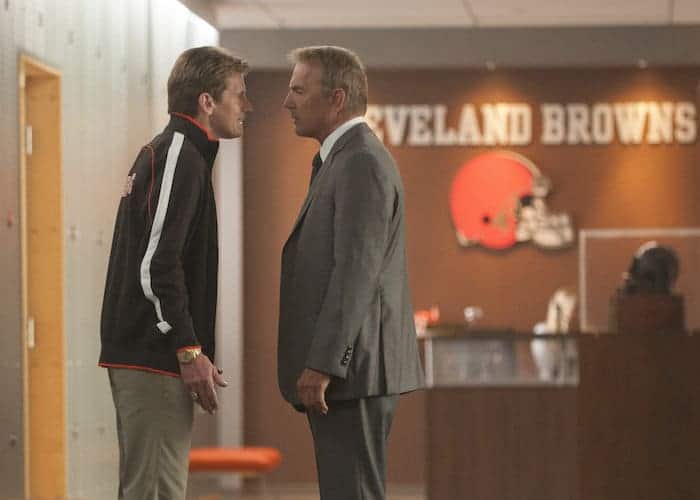
For a lot of people, the appeal of sports movies is watching the characters playing the sport. High Flying Bird and Draft Day are, to use an ironic term, more inside baseball. That means they’re more for the very serious followers of the NBA and NFL, respectively, the fans who pay attention to the draft and the rest of the business behind the scenes of the games. Maybe they’re also for the people who don’t like sports but do like dramas about wheeling and dealing — I can attest to enjoying both more than I do actual pro basketball and football. But I also just love movies, sports not so much.
Draft Day stars Kevin Costner as the general manager of the Cleveland Browns during what appears to be the most stressful day of the year for all the old white guys on the sidelines — and this Draft Day turns out to be the tensest moment of this one old white guy’s career. The movie is like High Flying Bird in also being a rapid-fire behind-the-scenes Sorkin wannabe, though McCraney and Soderbergh accomplish that far better than writers Scott Rothman and Rajiv Joseph and director Ivan Reitman do here. In both cases, their ensemble casts are worth watching even if you don’t always get what’s going on.
Moneyball (2011)

If you want actual Aaron Sorkin, at least for a final draft, there’s Moneyball, a Best Picture nominee which, unlike High Flying Bird and Draft Day, is based on a true story and real people. The interesting thing about this movie is that Soderbergh was attached to direct all the way up until a few days before filming began. Then Sony put the project on hold last minute and canned him. That was before Sorkin’s re-write. Soderbergh had intended to feature occasional interview segments with real baseball players, which is something he does with basketball players in High Flying Bird.
Moneyball is, like Draft Day, focused on the owners and managers than the agent side of the business that we see in Soderbergh’s movie, though like High Flying Bird it’s also dealing with a revolutionary idea about how the business of the game is run. Brad Pitt stars as then Oakland Athletics general manager Billy Beane and Jonah Hill as a character based on Paul DePodesta, whose introduction of sabermetrics to build a team helped change a lot of how Major League Baseball runs as a business. It’s quite entertaining for a story about statistics.
The Dotted Line (2011)
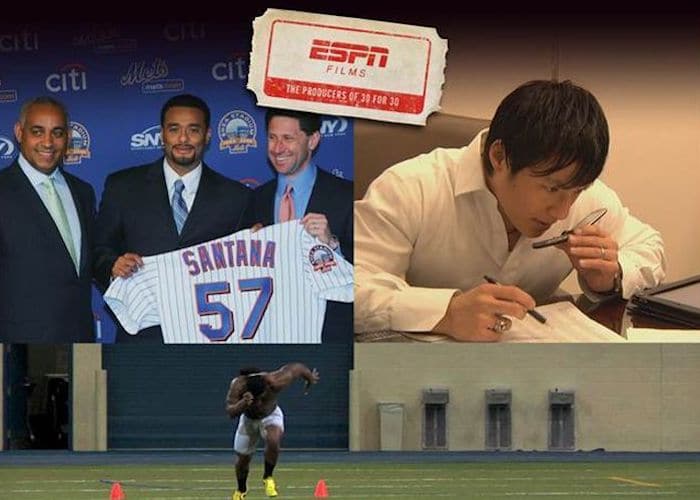
I’ve never thought of sports agents as the villains of the business, but I also haven’t thought a lot about sports agents in general. And I don’t consider Holland’s character in High Flying Bird a bad guy, but maybe the people he works with, including the guy played by Zachary Quinto, are? The Dotted Line, an ESPN documentary by Morgan Spurlock (Super Size Me), was sold as a look at the guys considered “some the most hated people in professional sports.” After watching this 30 for 30 installment, I get it.
Most of the documentary is focused on football agent Eugene Lee and baseball agent Peter Greenberg while also briefly showcasing the notorious Drew Rosenhaus and the scandalous Josh Luchs, but eventually they get to a couple basketball agents who are more relevant to High Flying Bird, namely Mark Bartelstein and David Falk, who admits that cheating is just part of the game outside the game if you want to be a successful agent. Other 30 for 30 docs that are slightly significant to the subject matter of Soderbergh’s movie include Years of the Scab, Broke, and O.J.: Made in America, the last of which I’ll get to below.
The Journey of the African-American Athlete (1996)
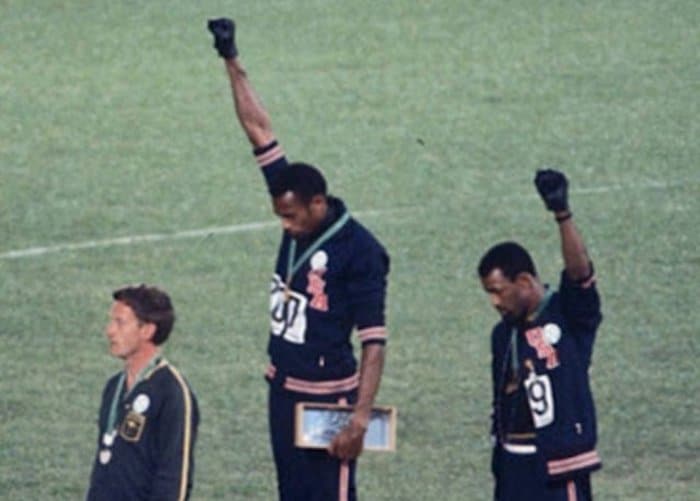
“You need to read this,” says Sam (Zazie Beetz) as the closing line of High Flying Bird. And indeed, you should read the book she’s holding, which was inside the package given to Erick (Gregg) by Ray (Holland) in the first scene. It’s The Revolt of the Black Athlete by Dr. Harry Edwards, a sociologist and activist who was an instrumental part of the iconic black power salute by track medalists Tommie Smith and John Carlos at the 1968 Summer Olympics (the image is on the cover of the book). He appears in and is discussed in The Journey of the African-American Athlete, an HBO documentary narrated by Samuel L. Jackson that, like Edwards’ book, sets up a history of black athletes up to that point. The doc obviously covers another 25 years.
I recommend Journey because it covers a lot more ground than just the 1968 gesture of protest, but Edwards also appears as a commentator in numerous other documentaries, including O.J.: Made in America, ’51 Dons, the 1936 Olympics-focused Olympic Pride, American Prejudice and the American Experience installment Jessie Owens, and the 1968 Olympics-focused films Salute, Black Power Salute, and Fists of Freedom: The Story of the ’68 Summer Games. On the same themes of black athlete activism and progress, I also recommend The Trials of Muhammad Ali, Ken Burns’ Jackie Robinson, and the Frontline episode League of Denial: The NFL’s Concussion Crisis.
Jerry Maguire (1996)
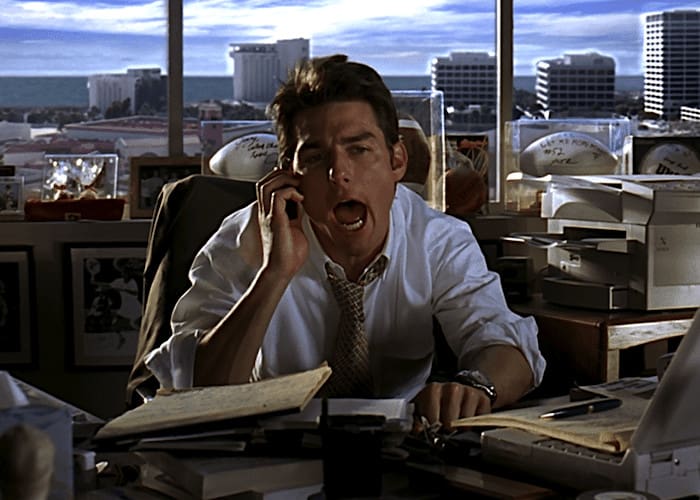
For a long time, my reference point for sports agents was the title character in Jerry Maguire. No wonder I didn’t think they were villains of the business! The “key to this business is personal relationships,” right? Of course, Jerry (Tom Cruise) starts out the movie writing a mission statement criticizing how the sports management business is conducted by most of his fellow agents, those snakes. So, he’s fired and left to start his own desperate enterprise on the side. And unfortunately, his good intentions don’t always work out, especially when racist dads are involved.
Cameron Crowe’s Best Picture nominee is concentrated on the behind-the-scenes operations of football — when it’s not centered around the rom-com plot of Jerry being completed by Dorothy (Renee Zellweger). But unlike High Flying Bird, Draft Day, and Moneyball, one of the main characters of Jerry Maguire is a player (Cuba Gooding Jr. in his Oscar-winning performance) and so there’s a bit more of the game on screen for those fans who prefer the sport in their sport movies.
The Big Picture (1989)
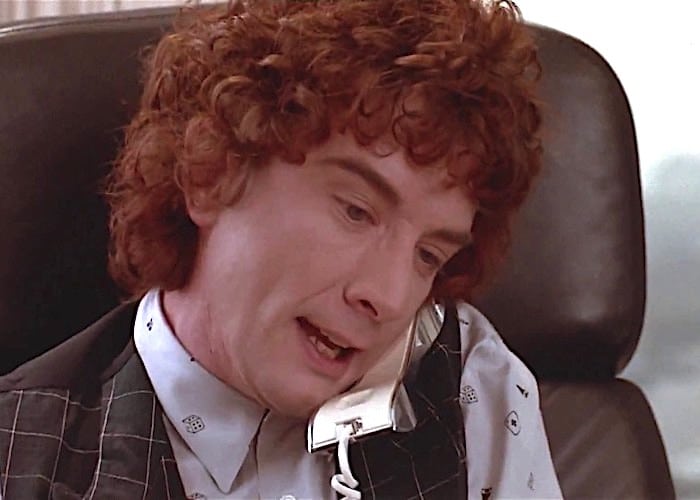
This one is a bit of a wildcard pick. I thought about The Player while watching High Flying Bird, probably just because I am a movie guy rather than a sports guy and was trying to think of a film industry set equivalent. But I just recommended The Player a week ago to watch after another Netflix movie, Velvet Buzzsaw. So, here’s an alternate. The Big Picture is kind of a lighter precursor to Altman’s movie. It’s the non-mockumentary feature directorial debut of Christopher Guest, who would later tackle Hollywood again with the mockumentary For Your Consideration.
Unlike The Player, this movie is more about the talent than the businessmen, following the story of recent film school grad Nick Chapman (Kevin Bacon) attempting to get his first feature project off the ground. It kind of parallels the experience of a prospective athlete, especially one in limbo like the rookie Erick in High Flying Bird. There is an agent character, played by Martin Short, and I love the climactic montage where he’s heavily involved as his client is the talk of the town while Nick happens to be off the grid and missing all the buzz and attempts at contact. It’s better than anything in Entourage.
Putney Swope (1969)
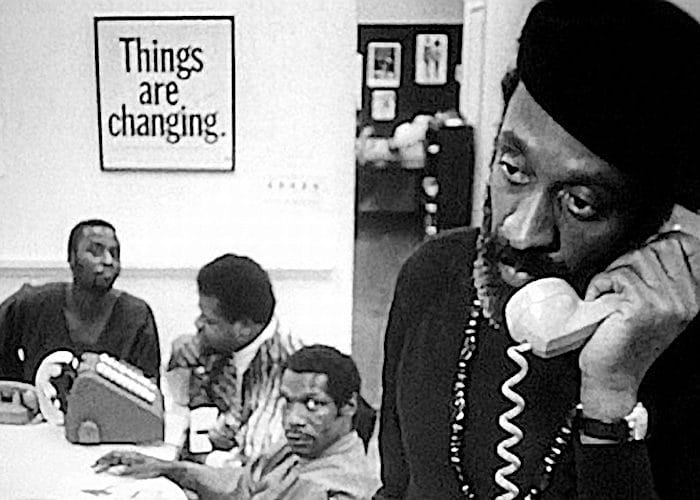
I have to give credit where it’s due, as I learned from Ray Pride’s review of High Flying Bird at NewCity Film that Soderbergh assigned the copyright of his latest to Truth and Soul Advertising Inc. I’m glad that came to my attention after missing it myself, because it allows me to recommend this satirical gem directed by Robert Downey (you know, RDJ’s dad), a filmmaker Soderbergh has subtly referenced before (see his influence especially in Schizopolis). Truth and Soul, Inc. is the fictional agency from Putney Swope,
Downey’s film is about an African-American ad man (Arnold Johnson) put in charge of the company by mistake. He then renames the company Truth and Soul, replaces the mostly white board with fellow persons of color, and takes the opportunity to revolutionize the industry, or at least his agency’s part in it, receiving negative attention from the government in the process. Where High Flying Bird takes its subject matter seriously, Putney Swope is a brilliant exaggeration, but they’re both ultimately looking at some of the same issues of race in America, and each with a white director at the helm. I find it interesting that Soderbergh references this and Edwards’s book, both of them having come out the same year.
Sweet Smell of Success (1957)
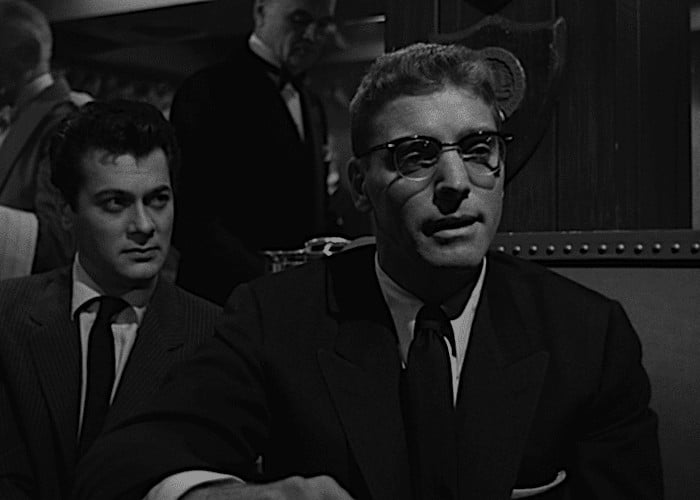
Pride also references this movie, and that’s how I came upon the review, by looking to see if anyone else made the comparison. There is some difficulty in connecting the premises of Sweet Smell of Success and High Flying Bird, yet they both are centered around sharp-tongued, shark-like characters often meeting in Manhattan restaurants and bars. In Holland’s character in Soderbergh’s movie, you’ve got a combination of Burt Lancaster’s powerful columnist, J.J. Hunsecker, and Tony Curtis’ press agent, Sidney Falco, without the sliminess of either.
Soderbergh also cites the influence of this movie in an ESPN interview about his latest:
“There were certain genre antecedents that we drew on, like ‘Sweet Smell of Success,’ or in my mind, strangely, ‘Glengarry Glen Ross’ — these sorts of hyper-verbal, fast-moving pieces about people who want things and use their mouth to get them.”
Soderbergh has already, in the past, acknowledged viewing Sweet Smell of Success in his lists of what he’s watched through a given year. He’s recognized all of its dialogue as his favorite “line” from a movie. And that would all imply that High Flying Bird owes more to Clifford Odets (and co-writer Ernest Lehman) than Sorkin, who upped the ante as far as wordiness in scripts go. Odets was more quality than quantity. And High Flying Bird is, too — a bit more old fashioned, favorably so.
Related Topics: Andre Holland, High Flying Bird, Movie DNA, Robert Downey, Sports, Steven Soderbergh
